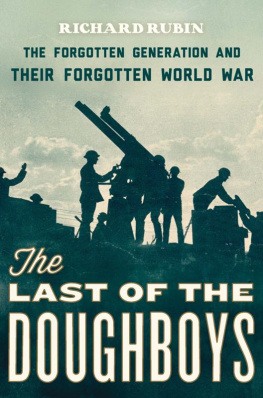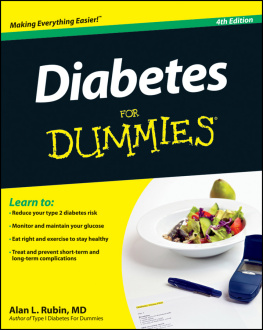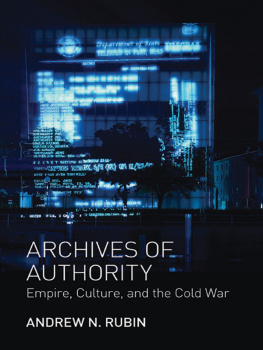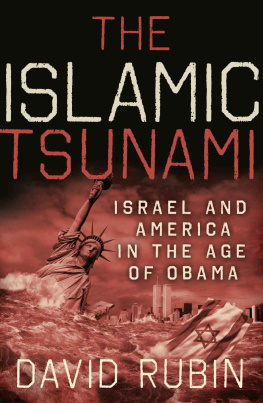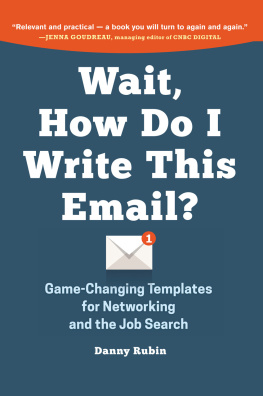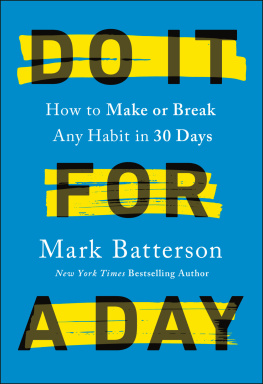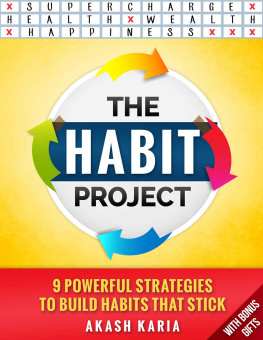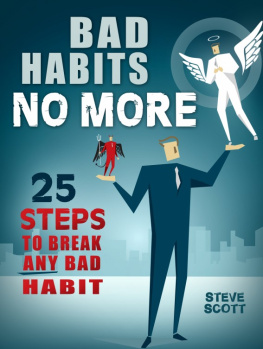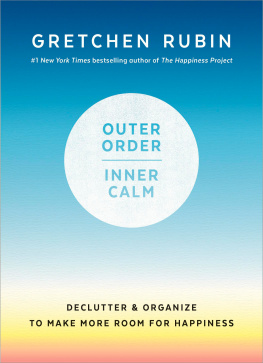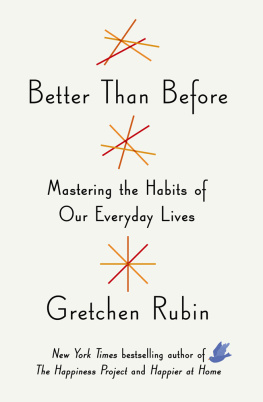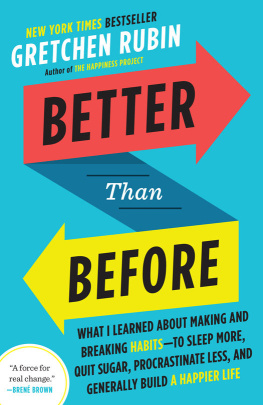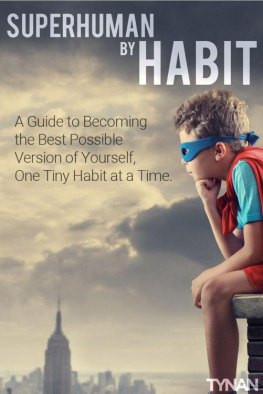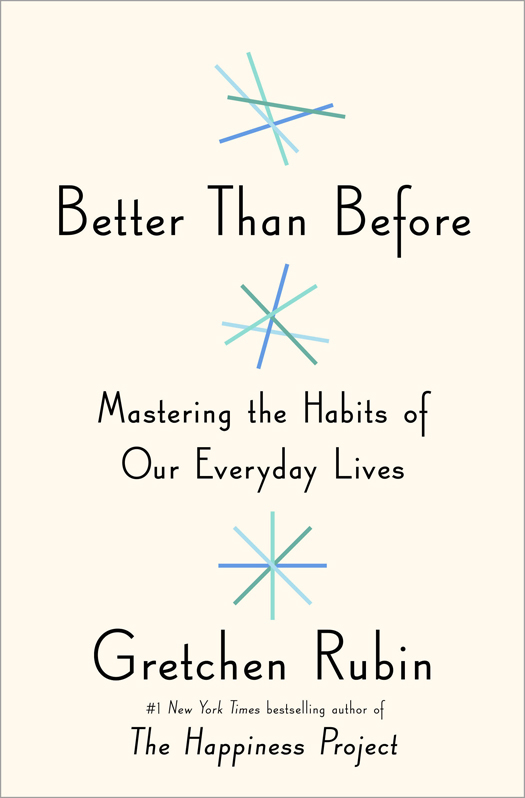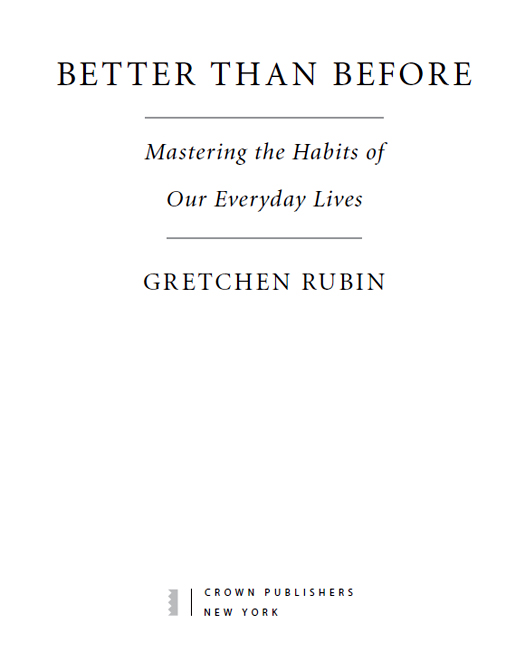MORE PRAISE FORBETTER THAN BEFORE
Grab this now! Better Than Before is essential reading. In this generous and actionable book, Gretchen Rubin helps us make sense of how privilege and opportunity make so many of us unhappy, and shows how basic daily choices can free us to make the most of what we have.
Seth Godin, bestselling author ofLinchpin
Almost everyone wants to be betterslimmer, smarter, better looking, more interesting, more productiveand we want to know were improving, we want the reinforcing evidence. Gretchen Rubins new masterpiece, Better Than Before, shows us how. Unlike other books on habits, Rubins book gives us the specific tools and a blueprint for getting back on trackthe fast track.
Brian Wansink, Ph.D., bestselling author ofMindless Eating
A LSO BY G RETCHEN R UBIN

Happier at Home
The Happiness Project
Forty Ways to Look at JFK
Forty Ways to Look at Winston Churchill
Power Money Fame Sex: A Users Guide
Profane Waste (with Dana Hoey)
Copyright 2015 by Gretchen Rubin
All rights reserved.
Published in the United States by Crown Publishers, an imprint of the
Crown Publishing Group, a division of Random House LLC,
a Penguin Random House Company, New York.
www.crownpublishing.com
CROWN is a registered trademark and the Crown colophon is
a trademark of Random House LLC.
Library of Congress Cataloging-in-Publication Data
Rubin, Gretchen Craft.
Better than before / Gretchen Rubin.
pages cm
1. Habit. 2. Change (Psychology) I. Title.
BF335.R82 2054
153.1dc23
2014031703
ISBN 978-0-385-34861-4
eISBN 978-0-385-34862-1
Jacket design by Christopher Brand and Ben Wiseman
v3.1
For my family, again
The greatest of empires, is the empire over ones self.
P UBLILIUS S YRUS
Contents
Better Than Before tackles the question: How do we change? One answerby using habits.
Habits are the invisible architecture of daily life. We repeat about 40 percent of our behavior almost daily, so our habits shape our existence, and our future. If we change our habits, we change our lives.
But that observation just raises another question: Okay, then, how do we change our habits? Thats what this book seeks to answer.
But while Better Than Before explores how to change your habits, it wont tell you what particular habits to form. It wont tell you to exercise first thing in the morning, or to eat dessert twice a week, or to clear out your office. (Well, actually, there is one area where I do say what habit I think is best. But only one.)
The fact is, no one-size-fits-all solution exists. Its easy to dream that if we copy the habits of productive, creative people, well win similar success. But we each must cultivate the habits that work for us. Some people do better when they start small; others when they start big. Some people need to be held accountable; some defy accountability. Some thrive when they give themselves an occasional break from their good habits; others when they never break the chain. No wonder habit formation is so hard.
The most important thing is to know ourselves, and to choose the strategies that work for us.
Before you begin, identify a few habits that youd like to adopt, or changes youd like to make. Then, as you read, consider what steps you want to try. You may even want to note todays date on your books flyleaf, so youll remember when you began the process of change.
To help you shape your habits, I regularly post suggestions on my blog, and Ive also created many resources to help you make your life better than before. But I hope that the most compelling inspiration is the book you hold in your hands.
I see habits through the lens of my own experience, so this account is colored by my particular personality and interests. Well, you might think, if everyone forms habits differently, why should I bother to read a book about what someone else did?
During my study of habits and happiness, Ive noticed something surprising: I often learn more from one persons idiosyncratic experiences than I do from scientific studies or philosophical treatises. For this reason, Better Than Before is packed with individual examples of habit changes. You may not be tempted by Nutella, or travel too much for work, or struggle to keep a gratitude journal, but we can all learn from each other.
Its simple to change habits, but its not easy.
I hope that reading Better Than Before will encourage you to harness the power of habits to make change in your own life. Whenever you read this, and wherever you are, youre in the right place to begin.
DECIDE NOT TO DECIDE
Introduction
It is a profoundly erroneous truism that we should cultivate the habit of thinking of what we are doing. The precise opposite is the case. Civilization advances by extending the number of operations we can perform without thinking about them.
A LFRED N ORTH W HITEHEAD ,
An Introduction to Mathematics
For as long as I can remember, one of my favorite features in any book, magazine, play, or TV show has been the before and after. Whenever I read those words, Im hooked. The thought of a transformationany kind of transformationthrills me. Whether the change is as important as quitting smoking, or as trivial as reorganizing a desk, I love to read about how and why someone made that change.
Before and after caught my imagination, and it also provoked my curiosity. Sometimes, people can make dramatic changes, but more often, they cant. Why or why not?
As a writer, my great interest is human nature, and in particular, the subject of happiness. A few years ago, I noticed a pattern: when people told me about a before and after change theyd made that boosted their happiness, they often pointed to the formation of a crucial habit. And when they were unhappy about a change theyd failed to make, that too often related to a habit.
Then one day, when I was having lunch with an old friend, she said something that turned my casual interest in habits into a full-time preoccupation.
After wed looked at our menus, she remarked, I want to get myself in the habit of exercise, but I cant, and it really bothers me. Then, in a brief observation that would absorb me for a long time to come, she added, The weird thing is that in high school, I was on the track team, and I never missed track practice, but I cant go running now. Why?
Why? I echoed, as I mentally flipped through my index cards of happiness research to find some relevant insight or useful explanation. Nothing.
Our conversation shifted to other topics, but as the days passed, I couldnt get this exchange out of my mind. Same person, same activity, different habit.


